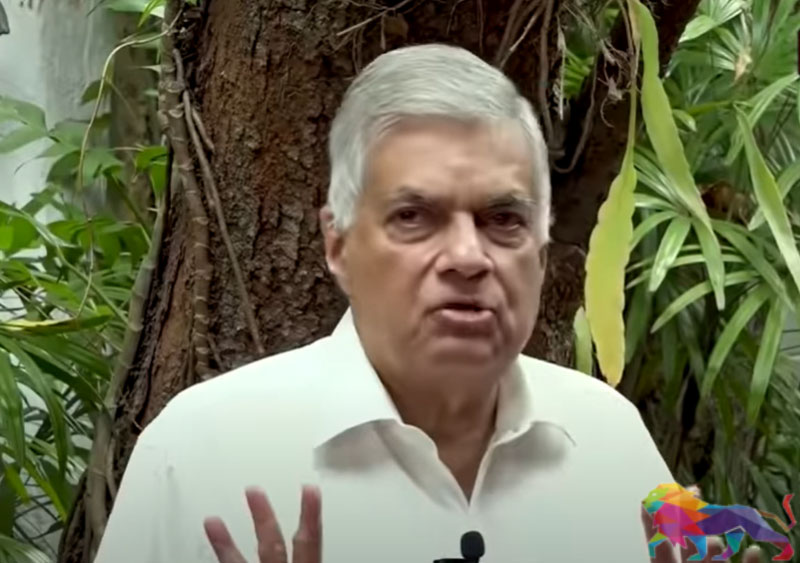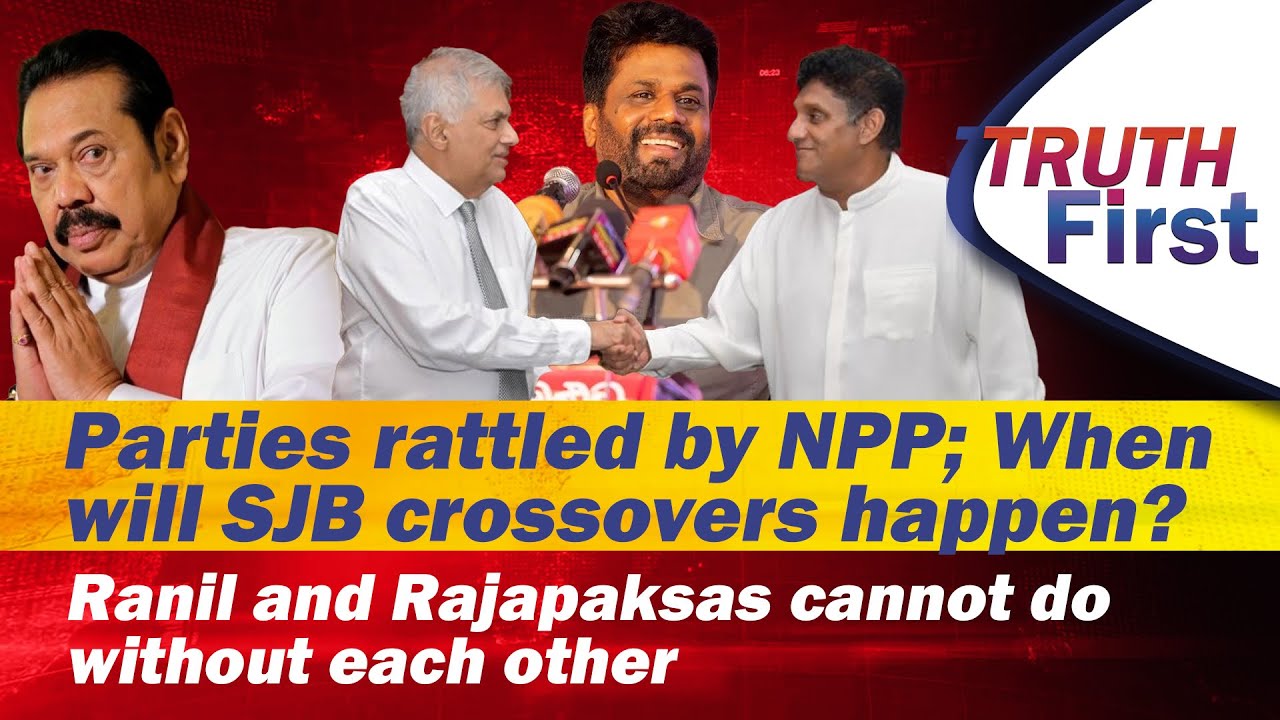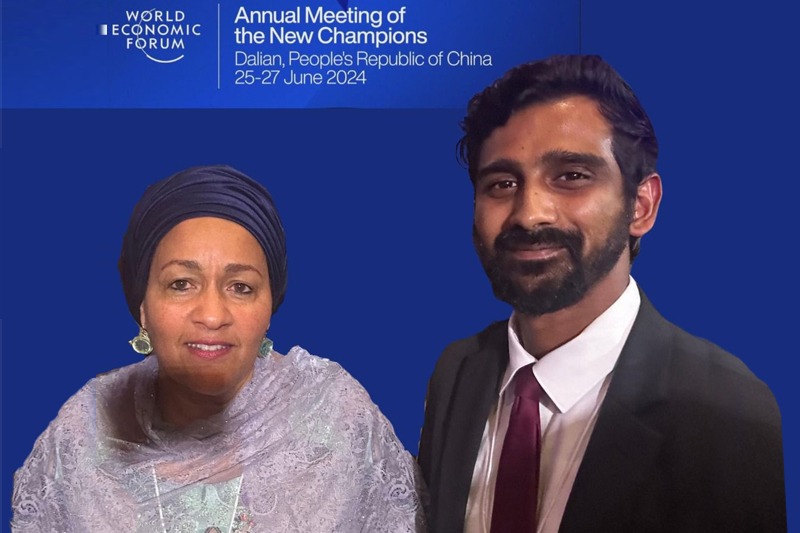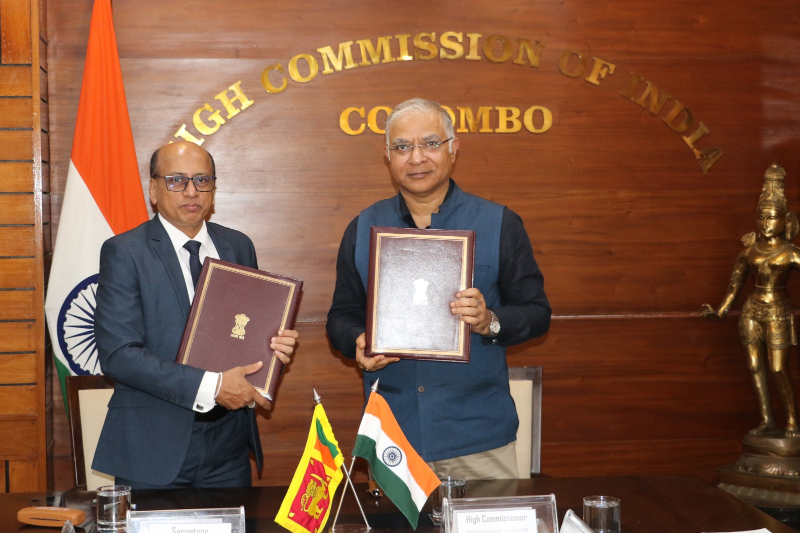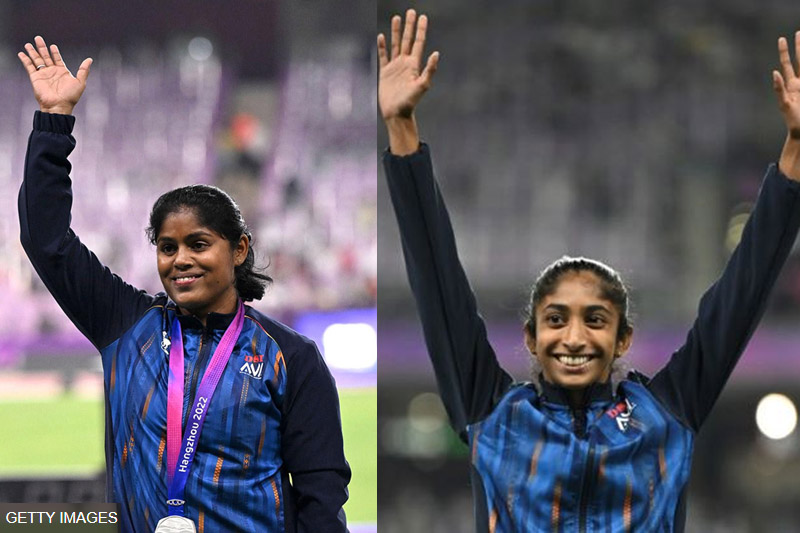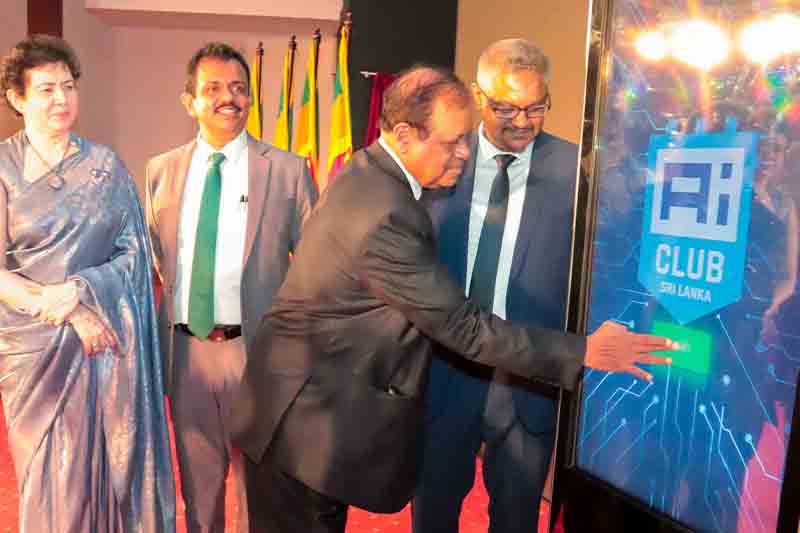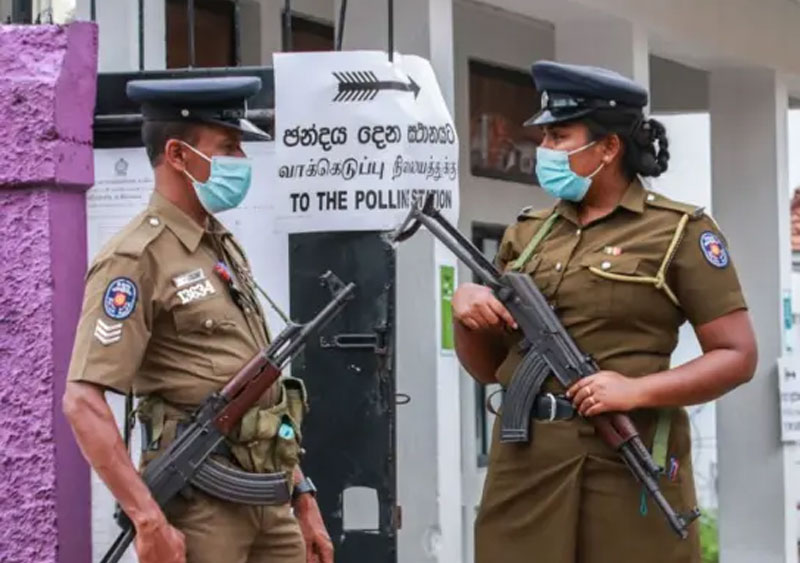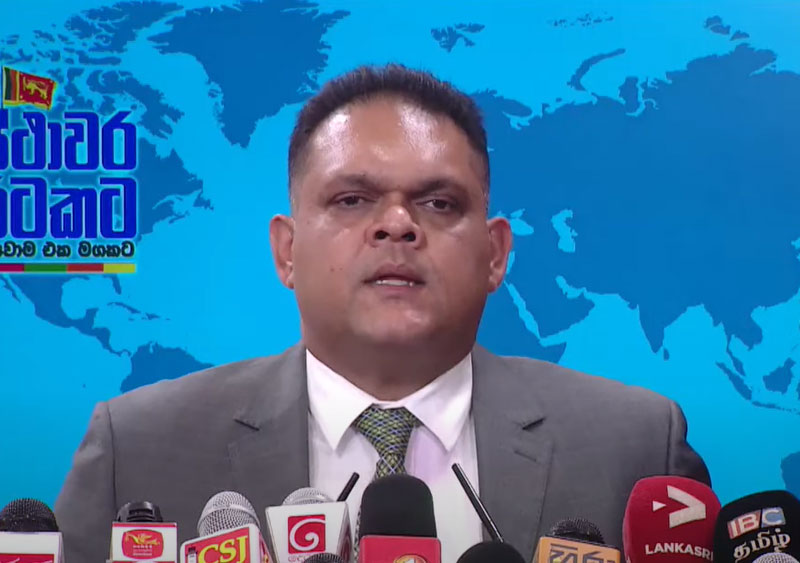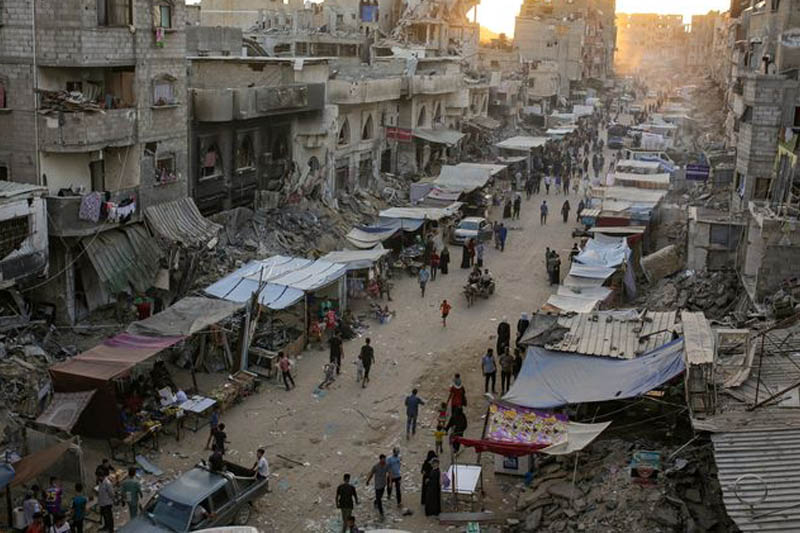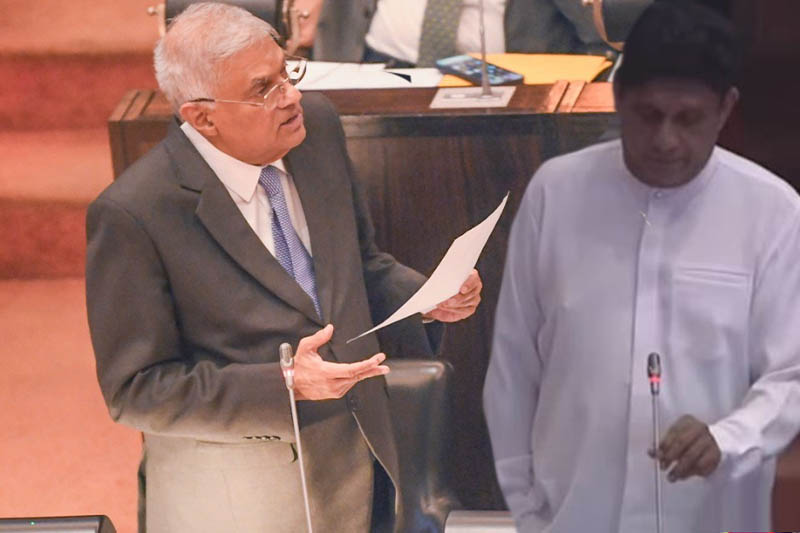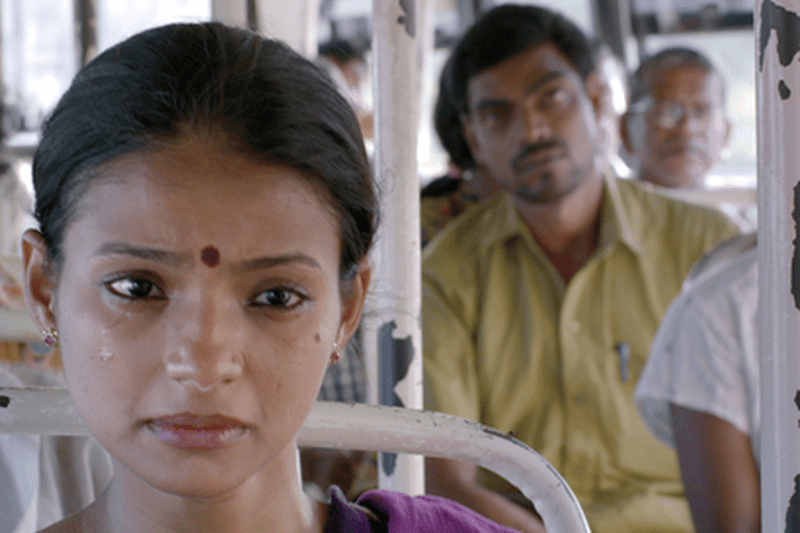Sri Lanka has no alternative but to seek the assistance of the International Monetary Fund (IMF) to overcome the economic crisis, former Prime Minister Ranil Wickremesinghe said.
He pointed out that working with the global lender would allow Sri Lanka to also seek support from other influential countries for its financial needs.
The UNP Leader made these observations responding to questions posed by a youth after a discussion with a group of university students yesterday (17).
Commenting further on the IMF, the former Prime Minister said:
After World War 2, the International Monetary Fund was set up to provide financial stability to any country that required its assistance. There is no country that has not gone to them for assistance, India has gone, and England has gone.
When the economy collapsed in 1977, we went to the International Monetary Fund and sought their assistance to create an open economy. It was only after that aid was received that other countries assisted.
By 1989, the war in the North and the terror in the South had caused the economy to collapse, aid was sought from them again. The economy collapsed again in 2001 and our economic growth took a turn for the worse. We went back and received aid from the International Monetary Fund.
There was a similar situation in 2015. After the war the income of our country decreased. Not only that, our development depended entirely on a short term development programme to spend the money given for the reconstruction in the North. In addition to spending the tsunami money on construction in the South, we received assistance from China to build highways and ports in 2013.
By the end of 2014, there was a major economic crisis. In 2015, we launched a new programme to increase our foreign exchange reserves to get a surplus on everything from our primary budget, namely debt repayments. We started a new development path and took it forward.
We actually faced the Easter Sunday bombing and had the opportunity to re-emerge. But here it has to be implemented for 10 years. After the last Presidential Election VAT was reduced, and the income of the country was reduced.
In addition, we and other countries suffered economic losses, especially due to the corona epidemic. We did not receive any foreign exchange. Our factories had to close down as well as other businesses. We received assistance from the International Monetary Fund to buy medicine.
I said in the election in 2020 that we would have to go to the International Monetary Fund and get $4 billion and by 2021, the situation exacerbated. I was told to go to a number of countries. They did not go in our case. It was then that I said that there was no solution for this country other than going to the International Monetary Fund, but they did not tell the country what their stance was regarding the International Monetary Fund."
Excerpts of the interview with Pasindu Gunarathna, an undergraduate student at the University of Sabaragamuwa is found below.
Pasindu:
Despite the initial reluctance of the present government, the Government has now decided to seek the assistance of the International Monetary Fund to overcome the economic crisis. Former Prime Minister, do you think we can really get out of this financial crisis with the help of the International Monetary Fund?
Former PM:
If we want to recover, we must first look at what an economic crisis is. In any country, in any economy, we have to work to produce goods, provide services and distribute them without any problems, especially when those problems arise. Economic crises occur when those problems arise.
The financial work here is the foundation. The economy is stable only when there is financial stability. We go to the International Monetary Fund only to discuss financial matters.
When we go there, the International Monetary Fund demands that a set of policies that can stabilize the country's economy, obtain foreign exchange to repay the country's debt and bring about development, be presented and that we agree with that set of policies, especially after the International Monetary Fund provides funding.
The money is not given for other activities but to implement that programme. They say that when the economy is being developed other problems will be solved. The IMF will not provide all the money needed for the country's economy. But to do all this, we must first negotiate with the IMF and succeed.
Pasindu:
Going back to the past, there were times during your tenure when the economy of this country was in crisis and with the help of the International Monetary Fund, there were times when this country recovered from that economic crisis. How did you overcome those crises with the help of the International Monetary Fund during your time?
Former PM:
In fact in 1977, the country had been completely devastated by the previous regime. Laws were passed forbidding eating rice for two days. So, we went to the open economy to recover from this collapsed economy.
We came up with a programme to transform that governing economy into an open economy. Especially when we started that programme, we got that money. That is why the rupee was able to float to an open economy. At the same time, when they saw these programmes, a number of countries came to our aid.
Many countries have helped us. However, for President JR Jayewardene, this policy alone was not enough. We need to do a lot of work. Our Mahaweli project received foreign aid. We built our trade zones with our own money.
The second time came about because of the war that was being waged on both sides. So how can the economy be made more relaxed? As the Minister of Industry, I brought forward a range of industrialisation programmes to take the economy forward through this period of stagnation.
What happened for the 3rd time was that the Port and the Airport did not function on the one hand, especially after the LTTE attacked us. So, the first thing was to stop the attacks on Colombo, it was not the IMF that could stop the attacks this war, but the ceasefire that J.R. agreed upon.
It was only after the ceasefire that money was raised to rebuild this economy. We were told that when the war ended, we would receive $4 billion. Accordingly, we went ahead.
The LTTE thought that our economy could fall further and affect Sri Lanka. As a result, our economy developed and the LTTE economy collapsed. When we went back to war we had a strong economy, they had a weak economy.
Next came in 2015 and the 2015 background I have already explained. Accordingly, we first tried to get our primary caregiver to pay for all the expenses we had, except to pay off the debt. Next we looked at the rupee that can be used to pay off debts when the surplus increases, and secondly we had to improve our foreign exchange reserves further.
We actually had a few programmes to improve them during this time. I think the East Terminal had $500 million. The investment for the Light Rail project was $2 billion, followed by the expressway for $500 million. In addition, I think the two LNG power plants built by Japan and India had $1.5 billion. The United States gave another $400-500 million to the MCC. Here alone there were 5 billion. The European Union could have given us more. But, we have not spent any of this. All investments for 2020 were stopped.
Pasindu:
One of the issues discussed last week was the government's decision to devalue the rupee. Accordingly, the Governor of the Central Bank stated that the value of the rupee against the dollar is determined by the market value. Is this a bad decision?
Former PM:
Of course the IMF has given us some advice. There are a number of directives in the Executive Board Assessment, implementing one alone is not going to work.
We have to come to an agreement with the IMF first. All of these other points are there when it comes to action. This is only one. We ask you to implement this programme in its entirety. We did the same thing before. We always met with the IMF and discussed the amount that would be provided to the country. Only then did we float the currency.
Twice before we have done this, but on this occasion the Central Bank decided to act ahead of time. The problem that has arisen from floating the currency is that there are not enough dollars to match the demand.
No one to guarantee the supply
When we go to the IMF we know we have relief coming. So the dollar supply increases. That is what creates stability. However, here the demand for dollars has increased substantially. At that point, there were no dollars to meet this increased demand and there was no one to guarantee the supply.
The demand for dollars has really increased here. At that time there was no supply to meet the demand and besides there was no team to guarantee it. So now we are reacting to the movement of the market. The banks have to find the money now.
Previously, we (the Government) provided assurances for the payments, while the banks were charged with finding the rest of the required money. Now the entire responsibility for this has been handed over to the banks alone. That is what is happening now.
I hope that the Government is now aware of this and will implement a short-term programme that will provide relief to the public who have been affected by this. At least 50% of the burden can be addressed by such a programme.
Pasindu:
We have seen that the government has recently announced that the number of foreign tourist arrivals has increased. Accordingly, more foreign currency has started flowing into the country. Do you think the country’s foreign earnings will improve through this?
Former PM:
In fact, most of our country's foreign exchange earnings come from the Middle East, from our apparel industry, and then from our tourism industry. About 2-3 million tourists visited Sri Lanka on a yearly basis, this has not happened since the COVID-19 pandemic. In fact the number (of tourists) coming to Sri Lanka is far less now. If we look at the numbers, I do not think even 10% of that number have visited Sri Lanka.
Our tourism sector would not be successful if we did not get at least 50% of those prior tourist numbers arriving in Sri Lanka now. We also have to recognise that many of the tourists visiting us are from Ukraine and Russia. They pay between US $70 – US $80 per room. From previously charging a $100 we have now reduced it to $70. So now those arriving from Europe will no longer pay US $100. They will pay only US $70.
So with this reduced income there are many problems which have arisen. All the trained staff such as chefs will now go overseas. When you earn $1000 here, you can earn US $2,500 – US $3,000 overseas. That is in the Maldives, in the Middle East you will be able to earn more. So there really is no big improvement from this despite a bit of money coming into the country.
Another problem that we have is that countries like the Maldives did not reduce their room rates like we did. Our tourism industry is also facing many problems. The Government has not acted to settle the debt faced by the industry. Every year interest is incurred by the industry. At present the interest owed by the industry has been provided with a moratorium. The interest has not been abolished. No relief was given, this was just an illusion. We cannot just get out of this.
In fact as the tourism industry grows, the price of our hotel rooms are reducing. We also face a problem of the hotels not having enough chefs and other staff members.
Pasindu:
Last week the Government took another decision, do you think this decision to halt the import of 367 non-essential items has the potential to revive the economy?
Former PM:
No, if it is market economy, it could be in Sri Lanka, it could be in England or it could be in China, the Government has the responsibility to provide goods and services according to the demands of the market, and ensure a supply of them if there is a shortage.
All the items that we controlled prior to 1977 are now available on the market. What are they now doing with a market economy?
We have now removed 300 items from the free market. With these 300 items being removed from the market, many of our services have halted. Our problem is to earn more money. These people are focussed on shortening the boundaries of our free market.
Prior to 1977, they tried to limit such items, so much so that tyres were not imported at the time. I was only able to find two tyres for my vehicle. A friend was able to find only one out of the two necessary tyres for his motorcycle. We had to borrow the tyres of a young person’s bicycle. Can we work like that?
We need to find foreign currency for the economy. This is not something we can split and share. We have to take into account our needs. This can be done if we go to the IMF. It is because we did not go that these problems have arisen. The problem that the IMF will have is that we have limited the import of 300 such items.
Pasindu:
In fact, before the power crisis, before the oil crisis, you stated the reason for all this. The Government has said that the dollar reserves in the country are declining. They are saying that due to the pandemic our dollar reserves have dwindled and our economy is facing a major crisis. But we have seen online, especially among the youth in countries such as Bangladesh and Nepal, that their dollar reserves are rising. We are the only ones who have seen our dollar reserves reduced, you have said from the outset that the oil and electricity crisis was coming. How was this mistake made if all the other countries in the region have seen them reach record high foreign currency reserves?
Former PM:
First of all we must remember that our markets and Bangladesh’s markets both had problems in 2020. But Bangladesh had foreign reserves, while we had lost ours. We had to ask for help, especially from the IMF.
If we had gone in 2021, we could have got $2 – $3 billion. But we did not go and get the money. Bangladesh had money. Many other countries like us went and got money when the problems arose.
But Sri Lanka did not do so, so we were marginalised. Other countries had money for 2020 and 2021, while those that did not went to the IMF for assistance.
We have no money and no aid. That is why we are in this situation. We cannot blame COVID alone because everyone was affected by COVID. We did not stop importing fertiliser because of COVID. Who is responsible for that?
Pasindu:
Finally, I would like to ask you, at a time when our economy is in deep crisis, what do you see as the key obstacles we have to overcome this economic crisis?
Former PM:
We should not think in the short-term, we must think long-term. A country is not built in a day. In 1977, we built the country.
Now we need to build the country for the youth, especially those in their 20s, 30s and 40s. We have to build a new foundation. This old system will not always have the money from the Middle East. Selling our services for US $70 will not help the situation. We cannot go ahead with the garment industry alone. We need to look to the future. We have to look to the future and build the economy to join the future.
National Consensus
If you do not think about that there will be many more problems. If we are to address this, then there must be a national consensus on the basic principles needed for this. There is no national consensus in our country.
One Government changes what the other government did. IF what we had started had been taken forward by this Government we would not have been in this mess. Today, this Government would not be in the mess that they are in. If we do not look to the future and move forward there will be no future.
Pasindu:
So, as youth, we have learned a lot about this economic crisis and how to overcome it. Finally, I would like to tell you that there is a large group of young people who have high hopes that this is our country. I would like to ask you to give them a message.
Former PM:
Take the lead and move forward.

